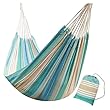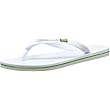
16 Uniquely Brazilian Souvenirs to Bring Home from Rio de Janeiro
1. Hammocks

Alternatively, head to Feira de São Cristóvão, at Avenida do Nordeste 29, a market that specializes in crafts from Brazil’s northeast, located at Campo de São Cristóvão in the neighborhood of the same name (you may want to make a day out of this hammock-chasing excursion). Open Tuesdays through Thursdays from 10am to 6pm, and Fridays between 10am and 8pm. Tel: (21) 2580.6946. You can also find a nylon version for outdoor adventures, such as camping, at Montcamp (Av. das Américas, 7707) - Barra da Tijuca. Tel: (21) 2438.8358. Open Monday to Friday from 10am to 7pm, and Saturdays from 10am to 3pm. Prices start at $40.
Address: Avenida do Nordeste 29, Campo de São Cristóvão
Operation Hours: Tuesday-Thursday: 10am-6pm; Friday: 10am-8pm
Phone: (21) 2580.6946
Montcamp
Address: Avenida das Américas 7707, Barra da Tijuca
Operation Hours: Monday-Friday: 10am-7pm; Saturday: 10am-3pm
Phone: (21) 2438.8358
2. Dry-Cured Cigars

There are quite a few tobacco shops in Rio and the one with the longest opening hours is Tabacaria Alto Estilo, offering a wide range of products. The shop is found at Av. das Américas, 2000, Barra da Tijuca. Tel: (21) 2439.2496. Open every day between 8am and 9:30pm. One single dry-cured cigar costs around $1. A box will cost around $8.
Address: Avenida das Américas 2000, Barra da Tijuca
Operation Hours: Monday-Sunday: 8am-9:30pm
Phone: (21) 2439.2496
3. Gemstone Crafts

Feira Hippie de Ipanema, the art market in the heart of Ipanema, is a great destination to go hunting for gemstone crafts. It takes place at Praça General Osório every Sunday from 9am to 5pm. For a more upmarket – and expensive – range of wearable gem-based accessories, Amsterdam Sauer is a well-known destination. Their first shop was inaugurated in 1953 inside the Copacabana Palace Hotel and their advertising campaigns feature major Brazilian celebrities. The company has several shops, including one on Copacabana’s sea front at Av. Atlântica, 1782. Tel: (21) 2548.6029. Open Monday to Friday from 8am to 8pm, and Saturdays from 8:30am to 7pm. Gemstone crafts from Feira Hippie can be purchased from around $50 apiece, and it’s okay to haggle in Brazil’s markets. At Amsterdam Sauer, you’ll need deeper pockets. For example, a citrine and amethyst ring will set you back $2,650.
Address: Rua Visconde de Pirajá 61, Ipanema
Operation Hours: Sunday: 9am-5pm
Amsterdam Sauer
Address: Avenida Atlântica 1782, Copacabana
Operation Hours: Monday-Friday: 8am-8pm; Saturday: 8:30am-7pm
Phone: (21) 2548.6029
4. Beachwear

Blueman is the top brand for Rio beachwear and part and parcel of its history. Created in 1973 by David Azulay, it sells its ware at mid-range prices, but shoppers can be sure to be taking home a quality product with great tailoring and fabulous patterns. Blueman makes beachwear for both men and women. It is found in many shopping malls, as well as in the heart of Ipanema at R. Visconde de Pirajá, 351. Tel: (21) 2522.8673. Open Monday to Friday from 9am to 8pm, and Saturdays from 9am to 6pm. Men’s beachwear starts at $60, while women’s beachwear prices are around $100.
5. Brazilian Ceramics

6. Canga

If you go for the ones sold on the beach, they will cost between US$10 and US$15 and the quality is good. If you’d rather buy one from a shop, head to Bali Blue. In business since 1990, the brand is heavily inspired by Tropicalism and Brazil’s exuberant fauna and flora. It was founded by a former navy officer who, upon visiting Bali for the first time, thought the Southeast Asian island’s style would travel well in laid-back Rio. Address: Rua Santa Clara 33, Units 301/303. Tel: (21) 2256.8369. Open Mondays to Fridays from 9:30am to 6pm, and Saturdays from 10am to 1pm. Prices vary but the most simple patterns costs as little as $10.
7. Cachaça

It can be bought at any supermarket and some specialized shops, such as Mangue Seco Cachaçaria. Located in the old center, this shop/restaurant is the only venue in the city that sells all cachaça brands made in the state of Rio de Janeiro, and it also sells rarities produced in other states as well, recommended by the Brazilian Cachaça Academy. Mangue Seco also specializes in seafood and samba music (Rua do Lavradio, 23 – Centro Antigo. Tel: (21) 3852.1947. Open Monday to Saturday from 11:30am. Closing times vary, but it stays open late on Friday and Saturday (1am and 2am, respectively). Expect to spend at least $10 to get a decent bottle of the stuff, although it can be cheaper than that. Very special, artisanal bottles can cost over $100.
Address: Rua do Lavradio 23, Centro Antigo
Operation Hours: Monday-Saturday from 11:30am. Closing times vary, but it stays open late on Friday and Saturday (1am and 2am, respectively)
Phone: (21) 3852.1947
8. Goiabada

The best places to buy goiabada are supermarkets. They sell them cheap and offer a wide range of options. Head to Pão de Açucar supermarket, which is all over Rio de Janeiro. If you happen to be in Copacabana, you can find one branch at Av. Nossa Sra de Copacabana, 493. Tel: (21) 2547.0372. Open every day from 7am to 11pm. Or just pop into any other branch and you’ll be able to get hold of your goiabada can there as well! Or go to Cosa Nostra delicatessen for a more artisanal option. Rua Visconde de Pirajá, 303. Ipanema. Tel: (21) 2523.2745. Open Monday to Friday from 9am to 7pm and Saturdays from 9am to 2pm. Popular goiabada brands sell from $5.
Address: Avenida Nossa Sra de Copacabana 493, Copacabana
Operation Hours: Monday-Sunday: 7am-11pm
Phone: (21) 2547.0372
Cosa Nostra
Address: Rua Visconde de Pirajá 303, Ipanema
Operation Hours: Monday-Friday: 9am-7pm; Saturday: 9am-2pm
Phone: (21) 2523.2745
9. Guarana Products

Mundo Verde is a health food chain that sells guarana products. One of the largest health food retailers, you can even find there guarana pills (combined with açai berry), recommended to fight fatigue and raise energy levels. It has several branches in Rio including one in the heart of Ipanema at Rua Visconde de Pirajá, 35. Tel: (21) 2287.0309. Open from 9am to 8pm, Mondays to Saturdays. Prices start at $15.
10. Chita

The best places to buy a piece of chita are popular fabric stores, such as Lealtex. If you are wondering around the old center, you can find a branch at Rua da Alfândega, 257/259. Tel: (21) 2232 8270. Or you can go to the Copacabana branch at Av. Nossa Senhora de Copacabana, 739. Tel (21) 2236.3085. Open from 9am to 7pm Mondays to Fridays and 9am to 2pm on Saturdays. Prices start at $10 per meter.
Address: Rua da Alfândega 257/259, Centro
Phone: (21) 2232 8270
Copacabana branch
Address: Avenida Nossa Senhora de Copacabana 739, Copacabana
Operation Hours: Mondays-Fridays: 9am-7pm; Saturday: 9am-2pm
Phone: (21) 2236.3085
11. Coffee

It can be bought at most high street supermarkets, such as Pão de Açúcar (Av. Nossa Sra de Copacabana, 493. Tel: (21) 2547.0372. Open every day from 7am to 11pm. If you’re after more upmarket, organic coffee, Armazém do Café may be just the ticket. The four-store chain offers a range of coffee types named after musical genres, such as samba and mambo. They have three branches in Ipanema, one of which is Rua Maria Quitéria, 77. Tel: (21) 2522.5039, open Monday to Friday from 8:30am to 8:30pm, Saturdays 8:30am to 7pm and Sundays from 10am to 6pm. If you happen to be in the old center, you can find them at Rua do Ouvidor, 77. Tel: (21) 2292.6987. Open Monday to Friday from 8:30am to 6:30pm. At the supermarket, prices start at $2. From finer merchants, $10.
Address: Avenida Nossa Sra de Copacabana 493, Copacabana
Operation Hours: Monday-Sunday: 7am-11pm
Phone: (21) 2547.0372
Armazém do Café
Address: Rua Maria Quitéria 77, Ipanema
Operation Hours: Monday-Friday: 8:30am-8:30pm; Saturday: 8:30am-7pm; Sunday: 10am-6pm
Phone: (21) 2522.5039
Address: Rua do Ouvidor 77, Centro
Operation Hours: Monday-Friday: 8:30am-6:30pm
Phone: (21) 2292.6987
12. Straw Baskets

Address: Praça General Osório, Ipanema
Operation Hours: Sunday: 9am-5pm
13. Musical Instruments: Caxixi, Berimbau, Cuíca

If you find yourself wondering around the old centre, you’ll find a specialized Capoeira shop, called Lapa Rio Capoeira, which sells berimbau and caxixi. It also sells other types of capoeira gear, including clothing and crafts. It is located at Rua da Relação, 49. Tel: (21) 2509.4855. The store is open Monday to Friday from 10am to 6pm, and Saturdays from 10am to 3:30pm. For a cuíca, head to Casa Góes Instrumentos Musicais, also in the old center, at Rua da Constituição, 19. Tel: (21) 2222.1200. Open Monday to Friday from 9am to 6pm, and Saturdays from 9am to 1:30pm. Berimbaus cost around $30. The price range for a decent cuíca starts from $80. Caxixis cost as little as $10.
Address: Rua da Relação 49, Centro
Operation Hours: Monday-Friday: 10am-6pm; Saturday: 10am-3:30pm
Phone: (21) 2509.4855
Casa Góes Instrumentos Musicai
Address: Rua da Constituição 19, Centro
Operation Hours: Monday-Friday: 9am-6pm; Saturday: 9am-1:30pm
Phone: (21) 2222.1200
14. Gilson Martins' Bag

He keeps three shops in Rio: two in Copacabana (R. Figueiredo Magalhães, 304. Tel: (21) 3816.552. Monday to Saturday from 9am to 8pm); Av. Atlântica, 1988. Tel: (21) 2235.5701. Monday to Saturday from 10am to 10pm, Sundays from 1pm to 7pm); and one in Ipanema (R. Visconde de Pirajá, 462. Tel: 2227.6178. Monday to Saturday from 9am to 8pm). On average, GM bags cost around $100 or more, although some smaller items cost around $50.
Address: Rua Figueiredo Magalhães 304, Copacabana
Operation Hours: Monday-Saturday: 9am-8pm
Phone: (21) 3816.552
Address: Avenida Atlântica 1988, Copacabana
Operation Hours: Monday-Saturday: 10am-10pm; Sunday: 1pm-7pm
Phone: (21) 2235.5701
Address: Rua Visconde de Pirajá 462, Ipanema
Operation Hours: Monday-Saturday: 9am-8pm
Phone: 2227.6178
15. Brazil Nuts

Health food stores are the best places to find organic Brazil nuts. Prana Produtos Naturais is one Rio’s health food pioneers. It inaugurated in 1980 with the Leblon branch. In 1994, a second branch opened in Barra da Tijuca (Av das Américas, 4666. Loja 141 (Mercado Praça XV) Tel: (21) 2431.9047). Open Monday to Saturdays from 9am to 5pm. Otherwise, most supermarkets will offer a wide selection of nuts, usually near the grocer’s and often giving a customer a chance to buy them by the weight. Pão de Açucar supermarket is everywhere in Rio, including Copacabana (Av. Nossa Sra de Copacabana, 749. Tel: (21) 2547.0372) and Botafogo (R. Voluntário da Pátria, 213. Tel: 2527.2609). Open Monday to Friday from 8am to 10pm, Sundays from 8am to 8pm. Brazil nuts cost around $25 per kilo.
Address: Avenida das Américas 4666, Loja 141, Mercado Praça XV, Barra da Tijuca
Operation Hours: Monday-Saturday: 9am-5pm
Phone: (21) 2431.9047
Pão de Açucar
Address: Avenida Nossa Sra de Copacabana 749, Copacabana
Operation Hours: Monday-Friday: 8am-10pm; Sunday: 8am-8pm
Phone: (21) 2547.0372
Address: Rua Voluntário da Pátria 213, Botafogo
Operation Hours: Monday-Friday: 8am-10pm; Sunday: 8am-8pm
Phone: 2527.2609
16. Cantão Dresses

Address: Avenida Afrânio de Melo Franco 290, Leblon
Operation Hours: Monday-Friday: 10am-10pm; Saturday-Sunday: 3pm-9pm
Phone: (21) 2294.2298
Other Interesting Souvenirs from Brazil
If traveling to Brazil is not on your immediate agenda, or you simply can't afford an extra space in your luggage, fortunately, these days, you can find a wide selection of authentic and truly interesting Brazilian souvenirs online. Presented here are some of the Brazilian products sought by foreign visitors, now available online for your convenience.
2. Brazil National Team Soccer Jerseys - One of the most recognized jerseys in the world, the famous yellow of Brazil. Participants at every World Cup, soccer-mad Brazil boast a proud tournament history, having won the prestigious trophy a record five times!!!
3. Sol De Janeiro Cosmetics - Sol De Janeiro's Brazilian cosmetics are really addictive to those who use it regularly, if not for its divine scent - smooth, calming and soft – then for the effect it produces on skin (saggy skin gets firm and tighten, and the rough skin - smooth, soft, and purified) as well as lips (moisturized, without an oily feeling, thanks to the immediate soaking). It does really make you feel as if you're on vacation on the sunny beaches of Rio!
4. Rio 2016 Olympics Merchandise - With the Olympic Games in Rio a few years away now, there's still an opportunity to pick up some one-of-a-kind Olympic souvenirs, from beachwear to collector’s items, including flip-flops, pins, badges, and mascot dolls (Vinicius - representing Brazilian fauna, and Tom - representing Brazilian flora).
5. Christ The Redeemer - The statue of Christ the Redeemer in Rio is the largest art deco statue in the world. Now this icon of Brazil is available in reproductions, designed to sit nicely on desktops, shelves or whatever else in your interior. A great gift for family and friends!
Walking Tours in Rio de Janeiro, Brazil
Create Your Own Walk in Rio de Janeiro
Rio de Janeiro Introduction Walking Tour
When Brazil became independent of Portugal in 1822, Rio de Janeiro became the capital of the Empire of Brazil. In 1889, Brazil became a republican nation, with Rio de Janeiro as its capital. But in... view more
Tour Duration: 3 Hour(s)
Travel Distance: 4.0 Km or 2.5 Miles
Rio's Top Religious Sites
Founded in 1590 by Benedictine monks from Bahia, the... view more
Tour Duration: 2 Hour(s)
Travel Distance: 3.0 Km or 1.9 Miles
Rio de Janeiro Beach Walk
Start your tour with a... view more
Tour Duration: 2 Hour(s)
Travel Distance: 4.9 Km or 3 Miles



































